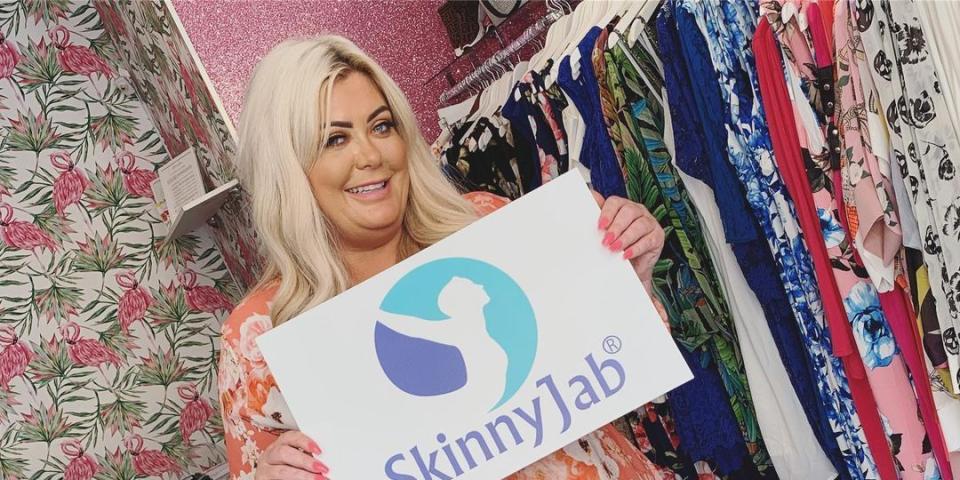What Actually Is the ‘Skinny Jab’ – And What Do Experts Think of It?

If you've knocked around Instagram for long enough, you've likely noticed a #ad promoting the 'Skinny Jab.' In 2020, The Only Way is Essex star, Gemma Collins, credited her recent weight loss to the product via a series of paid-for posts, as has former Atomic Kitten singer Kerry Katona.
The premise is simple: a four-week round of injections is all it takes for speedy fat loss. Skinny Jab claims to act by ‘removing hunger from the equation’ when it comes to shedding weight.
Sounds a touch too good to be true? Women's Health asked the experts to weigh in.

Okay. So what is Skinny Jab?
Skinny Jab is a series of daily or weekly injections of a drug called liraglutide. These are injected into your stomach, at home, using a pen-like device and work to significantly reduce how much hunger you experience, meaning fewer calories consumed and, therefore, highly probable weight loss.
Right now, there are a number of companies selling this drug, under different brand names – though, thanks to the endorsement of key famous faces extolling its efficacy, Skinny Jab seems to be the most visible.
Produced by pharmaceutical company Novo Nordisk, liraglutide, in a dose of 1.2 micrograms and prescribed under the brand name 'Victoza,' was originally invented as a solution to help patients with type 2 diabetes.
Since then, liraglutide has also been licensed for the treatment of obesity. In 2017, Novo Nordisk launched Saxenda (a higher dose of 3 micrograms) in the UK for use via private clinics for weight management. This can now be prescribed for people who are overweight or obese and works by stabilising your blood glucose levels and therefore decreasing your appetite.

‘Patients with type 2 diabetes are hyperglycaemic, which basically means that they’re consistently running at high levels of glucose in their blood,' explains Dr Jane Leonard, GP and cosmetic doctor.
‘Victoza was brought in as a medication for these patients, with a view to help stabilise their blood sugar.'
The higher dose, Saxenda, works to nix hunger, meaning that patients eat less food and so consume fewer calories.
The makers of the medicine tell WH: 'It is important to note that Victoza is indicated for the treatment of diabetes, not obesity, and that Saxenda is indicated for weight management, not diabetes – an important distinction to avoid off-label promotion for diseases they are not licensed for.'
If you take liraglutide/Saxenda via Skinny Jab, you'll have a medical consultation and clinical assessment to check you're suitable, before embarking on a four week plan.
Is the Skinny Jab legal?
It is legal and was approved for medical use in Europe in 2009. The National Institute for Health and Care Excellence (NICE) guidelines for the drug are that it should be used for those who have a BMI of over 30 (classified as obese) or between 25-30 (overweight) only if they present with another weight-related condition such as type 2 diabetes, high blood pressure or sleep apnoea.
Recently, NICE recommended Saxenda as a treatment for obesity to be used in the NHS, for people with a BMI of 35 or more, and who are also pre-diabetic with a high risk of developing cardiovascular disease , due to risk factors like high blood pressure or high cholesterol. It will be prescribed along with a programme on eating fewer calories and upping physical activity, and will be canned if the person in question doesn't lose at least 5% of their body eight within 12 months.
Commercial companies, do, however, sell rounds of the med to patients who do not necessarily meet this criteria. On SkinnyJab's website, it is stated that they would 'advise that patients will require a BMI of over 25 to do SkinnyJab' (sic) with zero mention of the 'weight related condition' guideline.
Why? 'Being even a couple of stone overweight with a BMI of 25 could have an impact on developing diabetes or heart disease in the future,' is the rationale for this, offered to WH by SkinnyJab founder Caroline Balazs. 'It is at the discretion of the prescriber to assess the suitability of each individual patient. It is not illegal to prescribe a drug in its "off-licence” form.'
Does the Skinny Jab work?
When it comes to people who are not type 2 diabetic, does the medication work? Well, you'll likely lose weight. The SkinnyJab site states that average drop is 12-20lbs within the first four week course.
'Liraglutide will give you short term effects,' says Dr Leonard. Problems arise if this leads to an unhealthy relationship with your body and to food. 'The risk is if people were to go on it, drop weight, go off it, put the weight on again and go back on again,' she adds. 'It shouldn’t be used as an alternative to promoting a healthy diet and lifestyle, which is the only thing that can maintain a healthy weight with longevity.'
SkinnyJab say that their courses are complete with access to a clinician and dietary planning during and after the course, and that it is designed to achieve lasting weight loss.
How much does the Skinny Jab cost?
A four-week course of SkinnyJab will currently set you back £250 for a set of daily injections or £500 for stronger, weekly injections. Top up jabs after the four weeks are at £175 for the daily and £400 for the weekly. These last for two to four weeks at a time.
All programmes come with ‘24/7 aftercare, dietary programme and support and advice to maximise your weight loss results,’ according to the site.
What are the potential side effects?
A 2017 review of the existing evidence of liraglutide stated that: 'The most common adverse effects were gastrointestinal and primarily occurred early in the treatment course.' So we're talking nausea, constipation, diarrhoea and stomach pain.
And bigger picture? ‘It’s too early to tell what damage these liraglutide jabs will have on the body long-term,' says Dr Ross Perry, a GP and cosmetic doctor. (The 2017 review states: 'Additional studies are needed to determine its long term efficacy and safety profile.') ‘But, like any form of medication, there will always be side effects to be aware of.'

Concerns have been raised about the drug incurring potential hypoglycemia – a fall in blood sugar levels to below normal. SkinnyJab refute this, stating the official Novo Nordisk line: 'Since liraglutide mimics the glucose-sensitive action of native GLP-1, it does not induce hypoglycemia.'
Thyroid cancer concerns were brought up when research in rats and mice showed a positive correlation between liraglutide and cancer cells, but no increased risk of this illness has been witnessed in any patients who have taken it, at this point. Balazs says: 'There is no human evidence of thyroid issues, which has been fully researched. Any drug can have side effects. Even common ones like Paracetamol.'
Straight up: is the Skinny Jab safe?
The answer to this depends on who you ask, and in what context it has been prescribed. For her part, Dr Leonard says the danger of liraglutide lies in the person prescribing the drug and the person who gets prescribed it. ‘In a risk-benefit analysis, you might give it to someone with type 2 diabetes, for whom the benefit to health could outweigh the potential risk of the medicine.’
‘And presumably we’re prescribing them as doctors – these are GPs or endocrinologists who have your medical history on front of them,’ she goes on. She states that it could be an issue to be prescribed it by someone who doesn’t know your medical history or family history.
Balazs counters this. 'The prescribing advanced nurse practitioners working for SkinnyJab also work and prescribe for the NHS. They are all qualified to masters degree level in advanced clinical practice and have much more experience in diabetes and obesity management, having far more experience and qualifications in this field, than an average doctor – which is why SkinnyJab use such professionals,' she tells WH.
And what about celebrity endorsement?
Another issue, the medical experts claim, is in the social media promotion by celebrities and influencers. ‘This is extremely dangerous as the majority of the celebrities claiming to use liraglutide have a young and impressionable fan base,’ says Dr Perry.
‘By seeing someone you idolise on social media receiving thousands of comments for ‘looking great’, it glamorises the product and ultimately encourages young adults to invest in something which may be dangerous, or of little use to them.’
For Balazs, using famous faces to spread awareness of her jabs is a net good. 'Obesity can cause so many long term chronic diseases that are associated with being overweight. Celebrities can very effectively get a message out there that has relevance and meaning to peoples lives,' she told WH.
'Our message, whether we use a celebrity or not, is always about health and prevention, not a quick fix. This is about educating the public and celebrities are sometimes the best way to deliver those messages, as people can and do in fact relate to them. We use ‘real-bodied' celebrities as an influence because we do not want to ever promote an underweight or an unhealthy image. We encourage a healthy diet and lifestyle planning as part of our programme.'
She continued: 'We need to wise up to the fact that obesity is a huge problem in this country and this is the biggest cause of death [Ed's note: according to the Office for National Statistics, dementia and Alzheimer’s disease were the single biggest cause of death in the UK in 2018. Coronary heart disease, for which obesity is a risk factor, is a leading cause of premature death.]
'Anything that is relatively safe, prevents the development of serious long term illness and effectively assists to encourage more healthy life choices can only be a good thing, surely.'
It is worth noting, however, that in one advertising post for the brand by Katona, the drug is presented as way of dealing with post-festive 'guilt' over food.
'Chocolates, turkey, mince pies... oh and of course pigs in blankets - what didn’t we indulge in over Christmas? But thanks to @skinnyjab and their team, that post-festive guilt is no longer! Knowing that I have the jab on hand over Xmas has really helped me finally enjoy all the best parts about Christmas- the food!,' the singer captioned an image of herself on December the 27th, 2020.
What’s the alternative to the Skinny Jab?
Real talk: It's nothing shiny and new. But, if you are overweight and are looking to get your BMI in the 'healthy' range, then the experts advise doing so via a nutritious eating plan and taking up some form of movement.
‘The reality is there is no ‘quick fix’ for weight loss, as ultimately anything which offers drastic results in a short period of time is not healthy and can lead to long-term weight problems and issues with food,’ says Dr Perry.
‘Losing weight correctly and slowly will mean the weight will stay off longer in the long run.’
You Might Also Like

 Yahoo Finance
Yahoo Finance 